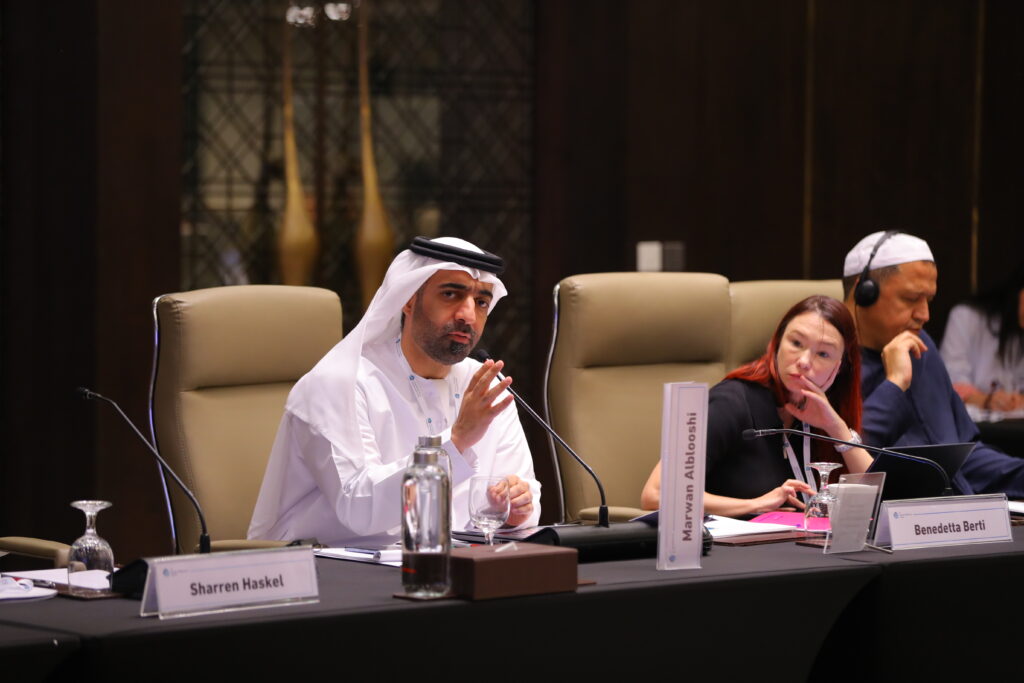The European Leadership Network (ELNET) and ELNET’s Forum of Strategic Dialogue (FSD), together with the Emirates Policy Center (EPC), Abraham Accords Institute and MENA 2050 and with financial support of the German Federal Government Commissioner for Culture and Media, brought together 34 senior policymakers and experts from Europe, the Middle East, including Saudi Arabia, the UAE, Bahrain, Egypt, Jordan, and the Palestinian Territories, and for the first time from Indonesia, as well as from the U.S. The overall theme of the forum was “The Middle East and Europe: Fostering Security and Innovation through Strategic Partnerships.” The dialogue addressed the following topics: developments in the Middle East in light of October 7, the extension of normalization with Israel across the MENA region and beyond, prospects for increased cooperation and European involvement, pathways to stability in Lebanon and the Palestinian territories, and energy security.

The forum included senior representatives from ministries of foreign affairs, members of parliament, senior experts from think tanks, former diplomats, journalists, and civil society representatives from Europe, NATO, Middle East, North Africa, and Asia. The discussions were conducted strictly under the Chatham House Rule.
Executive Summary and Policy Recommendations
Developments in the Middle East in light of October 7
- The October 7 attacks marked a strategic shift for Israel and the broader Middle East.
- The peace dividend era is over. Israel, backed by the U.S., significantly weakened the threat of Iran and its proxies; Turkey’s regional power has grown.
- Urgent need to end the war in Gaza, bring back the hostages, and disarm Hamas.
- Abraham Accords seen as vital; UAE praised for stabilizing role.
- Further normalization depends on credible steps toward a Palestinian state; many Israeli voices question its viability.
Policy Recommendations
- Expand and preserve the Abraham Accords while avoiding unilateral Israeli actions (e.g., West Bank annexation) that threaten normalization prospects.
- Anchor a realistic peace framework, recognizing regional shifts and preserving a pathway to a two-state solution.
- Incentivize Palestinian political reform, backed by Arab funding and institutional capacity-building.
- Renew deterrence through deeper military and intelligence cooperation among Israel, the Gulf states, and the West.
Extending Normalization with Israel across MENA and beyond
- Five years into the Abraham Accords, Israel-UAE trade has thrived.
- The unresolved Palestinian issue remains a key obstacle, particularly for Saudi normalization.
- Israeli and some Western voices advocated decoupling normalization from the Palestinian track; others remain skeptical about Israel’s commitment to peace.
Policy Recommendations
- Enhance Europe-Middle East engagement, particularly in countering shared threats (counter-terrorism), securing maritime routes, managing migration, and regional diplomacy, especially led by the Gulf.
Prospects for Increased Cooperation and European Involvement
- Post-October 7, Europe’s role in the Middle East faces renewed scrutiny.
- Broad consensus exists on securing energy, preventing radicalization, and stabilizing conflict zones like Gaza, Syria, and Yemen.
- Growing focus on humanitarian and governance solutions for post-conflict recovery, though Palestinian leadership remains a key unknown.
- EU backs a two-state solution, but faces criticism for politicizing aid and relations.
- Internal EU divisions weaken its influence; stronger partnerships with Israel and the Gulf are urged.
Policy Recommendations
- Support economic-led normalization like IMEC and energy projects as a precursor to political progress, modeled after EU integration.
- Decouple technical cooperation from political deadlocks to maintain momentum in trade, infrastructure, and energy.
- Avoid entrenchment of extremist narratives by empowering moderates.
- Reframe the debate regionally, addressing broader challenges like migration, radicalization, and economic inequality.
- Redefine EU engagement beyond conditionality, focusing on practical cooperation in energy, security, and infrastructure.
- Invest in people-to-people initiatives to build regional trust.
- Avoid polarization by supporting incremental progress instead of binary outcomes.
Pathways to Stability: Lebanon and the Palestinians
- Consensus on the urgency of rebuilding Lebanese institutions and containing Hezbollah.
- Lebanon seen as a key opportunity.
- Recognition, especially from Europe and some in Israel, that Iran’s future inclusion is necessary for long-term regional stability.
- Shared belief that identity politics and poor governance drive instability; preference for power-sharing over imposed statehood.
- General support for expanding the Abraham Accords to boost economic ties and reduce sectarianism.
- PA viewed as non-viable, with no consensus on Gaza’s future governance.
Policy Recommendations
- Institutionalize the Abraham Accords (AA) with a formal secretariat and expand to include Lebanon, Syria, and eventually Iran.
- Support Lebanese state-building, especially the army and economy, through coordinated EU–U.S. investment and IMF mechanisms.
- Develop viable post-Hamas governance models for Gaza, prioritizing hybrid or Arab consortium-led arrangements.
- Foster inclusive regional dialogue on identity, power-sharing, and connectivity to counteract radicalism and geopolitical fragmentation.
Energy security and how Europe and the Abraham Accords countries can work together
- Israel, Egypt, and Jordan form a mutually dependent gas network, though crises exposed risks of over-dependence.
- Cyprus has not utilized its own gas reserves yet due to reliance on Egypt and lack of local LNG infrastructure.
- Projects like the East Med Pipeline face political (Turkey) and environmental (EU green agenda) opposition.
- Debate on balancing or separating geopolitics and economics.
- Broad support for IMEC as a key corridor for energy, digital, and green transition.
- Collective security and multilateral governance seen as essential for regional energy stability.
Policy Recommendations
- Israel should explore using coal/diesel during emergencies to maintain gas exports to Egypt and Jordan. Egypt and Jordan must diversify their sources to reduce dependence.
- Cyprus should prioritize local LNG import/export facilities to gain strategic autonomy. Regional gas storage and regasification capacity should be expanded.
- Advance IMEC as a strategic platform—transform it into a network including Africa and other East Med nations (including the Palestinians), fostering cooperation on energy, digital, and security.
- Establish central coordination mechanisms between the Gulf and the East Med to streamline joint projects and reduce political friction.
- Governments and politicians must communicate the strategic value of regional infrastructure projects to foster public support.